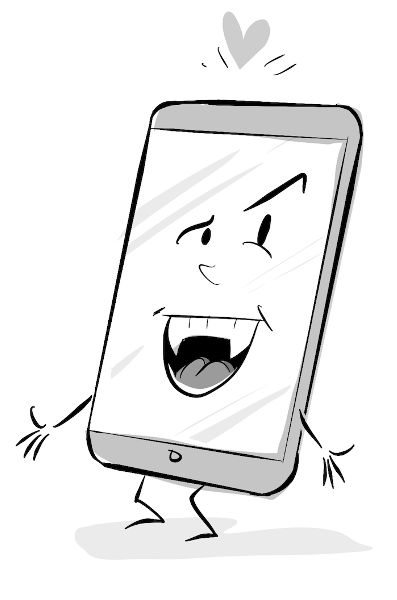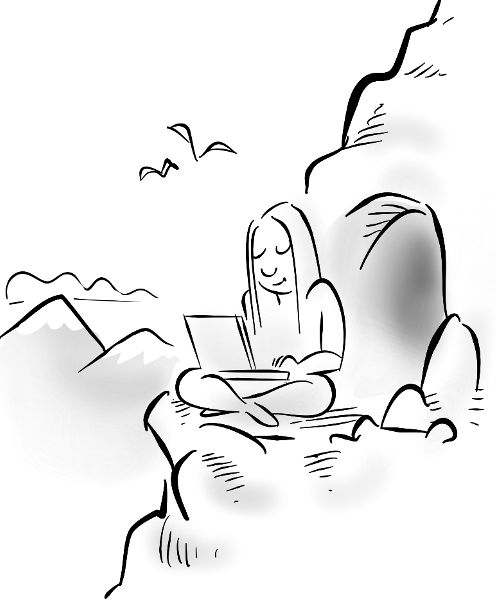 Chapter 11
Chapter 11
Eliminating Distractions
How many times have you gotten stuck for information while writing a paper, then whipped out your smartphone and googled it? The smartphone is the most versatile information resource in history, indispensable for today’s student. Yet when it comes to task completion, the smartphone is your frenemy.
Unlike your parents when they were in high school, whenever you are working on a task, you must contend with phone calls, texts and tweets, email, Skype, and dozens of other social media alerts, all saying the same thing: Look at this now! What you’re doing can wait! And when the task you’re working on is an uncomfortable one for you—threatening your excellence, social connection, engagement, or autonomy—the temptation to pick up your smartphone can feel irresistible.
If Athena didn’t answer the text from her boyfriend right away, he might think he wasn’t important to her. If her girlfriend posted a selfie on Instagram, she needed to praise it immediately or risk hurting her feelings. Everyone in her wide circle of friends knew Athena would be sympathetic to their problems, so she had numerous requests for her attention throughout her day. With all those interruptions, Athena never seemed to have enough time to study for school, to relax with a book, to practice her guitar, or even to sleep at night. If you’re a pleaser like Athena, whose connections to others is your most precious value, failing to respond to your social-media feed can make you very anxious.
Emily’s habit of picking up her phone in the middle of a task was based on her need to be in the center of the action. How could she focus on a boring reading assignment when she knew the latest social media post might be about a friend’s amazing rock-climbing accomplishment? And what exciting or important development might she be missing while she was doing her laundry? If Emily didn’t check her phone every five minutes, she felt she might miss out on something exciting that would fully engage her. And if her social feeds didn’t satisfy, movies and YouTube videos were only a few clicks away. If you’re a warrior like Emily, your smartphone offers reliable escape from deadly boredom to lively engagement.
When Jordan was faced with a task he couldn’t be sure he’d do well at, relief was as close as his smartphone. When texting his friends or monitoring Twitter feeds, the pressure to do things perfectly disappeared and he could relax. And because the Internet is the best place to do research, Jordan always had an excuse to go online. Once he’d googled something—the meaning or spelling of a word, for example—it was easy to hop around to other sites to get more ideas. This process could consume hours of his time, so that when he finally got around to working he was getting sleepy. If you’re a perfectionist like Jordan, who thinks you need to be clearheaded to do good work, you may often put off homework until tomorrow, when you’ll be fresh and rested.

When it comes to task completion, the smartphone is your frenemy.
When stuck with an assigned task he didn’t like, Tyler was easily distracted by his phone. The moment he picked it up, the chore or the homework disappeared and Tyler was in a world of his own, unreachable to his parents and other figures of authority. Why be trapped feeling like an anonymous drone when he could get updates on his favorite sports team, watch a funny video, or discover a hot new band? If you’re a rebel, you may feel the same.
Regardless of what type of procrastinator you are, when you have a task that threatens your core value, you don’t feel safe and are even more vulnerable to distractions than usual. Whether the impulse to pick up the smartphone is based on a need to please, to feel engaged, to avoid making a mistake, or to feel independent, it is, for most teens, the single biggest obstacle to getting things done. So, short of turning your phone off, what can you do to make it less distracting?
The first and most essential thing you can do anytime you are working on a task is to limit how often you check your email, text messages, and social media. The more often you stop to check, the less productive you’re likely to be. When you do need to check, set a timer for yourself to remind you to get back on task. If you are unable to monitor yourself this way, consult the following list of stronger measures.
As an alternative to these measures, there are a host of new apps coming out to help us manage the distraction of smartphones. These apps block whatever media you select for as long a period as you choose. Some even enable you to schedule recurring distraction-free sessions in advance.
Although adjusting phone settings and getting antidistraction apps takes some extra effort up front, you will notice a world of difference working at tasks without the interruptions of social media. And the messages that accumulate during your work session will be more satisfying for you to respond to when you know you have gotten something done.
Other Distractions
Of course, smartphones are not the only distraction you face every day. Hunger and thirst are compelling reasons to stop whatever you’re doing and make a trip to the kitchen, and once you’re there, who knows what other distractions will appear? Emily often became so absorbed in whatever game she was playing or music she was dancing to that she skipped meals. Then when she got around to her reading assignment, which did not fully engage her, within a few minutes she was hobbled by low-blood-sugar fatigue. Her solution? Keep a supply of energy bars—the same fuel she used for rock climbing—in her desk drawer, so when the hunger urge hit she could stay on task without leaving her room.
If you’re working at home, other family members can be distracting, especially for the pleaser. Athena’s mother might call for her help with housework or unloading groceries any time of day, and her younger sister had a habit of showing up at Athena’s door whenever she had a problem or something exciting to share. Athena felt that not responding would be perceived as rude and uncaring—which could jeopardize her connection to them—so when she was interrupted by her family she always set aside whatever task she was on. Between her friends and her family, Athena was like an emergency first responder, on call 24/7.

If others are distracting you from a task, change your environment.
Athena’s solution was to design a “Studying—Do Not Disturb. Thank You!” sign to post on her door whenever she needed to create some space for herself. When things got especially hectic at home, she grabbed her backpack and headed off to the library or her favorite coffee shop. It was scary for her to make herself unavailable and risk disappointing them, but Athena reminded herself that she deserved time to herself and that being authentic with her family was necessary for a true connection. As a bonus, Athena was surprised by how good she felt when she took care of herself.
The list of things that can distract us is, of course, infinite. Anything that feels less painful than the task at hand can grab our attention—even other tasks. When Tyler was assigned to trim the hedges one Saturday, a half-hour job, he devoted an hour to organizing the toolshed instead. What made a chore like organizing the toolshed attractive enough to qualify as a distraction? Simple. It was Tyler’s idea.
Emily so dreaded the boredom of picking up that she’d rather do twenty pushups than push a vacuum around her room. And when Jordan sat down to write a short creative essay, suddenly reviewing five chapters of social studies looked more appealing.
When you are faced with a task that threatens your core value, your perspective changes. Sights, sounds, smells, and thoughts beckon to you in new ways, promising relief from the uncomfortable feelings associated with the task. This phenomenon is bound to happen every time, so rather than allowing yourself to be blindsided, why not plan for it? The more you can anticipate distractions, the more practical steps you take to prevent them.
In the next chapter, I’ll introduce a powerful tool to prevent a condition that all four types of procrastinators commonly face: being overwhelmed.